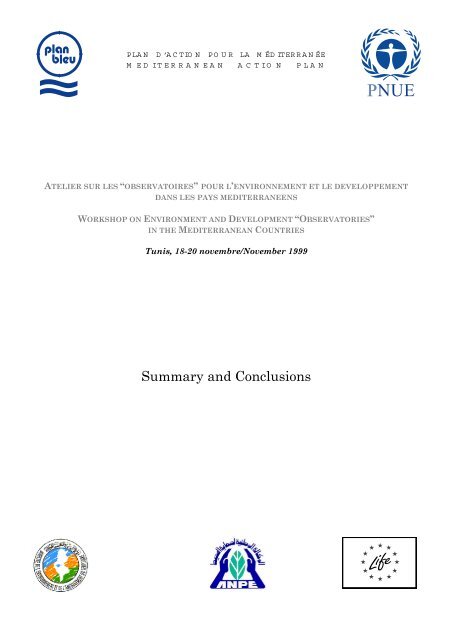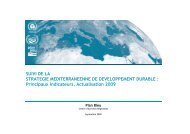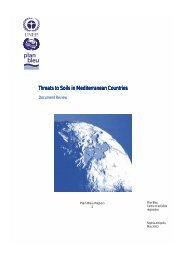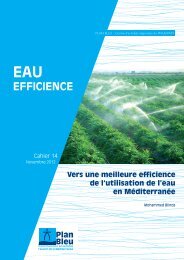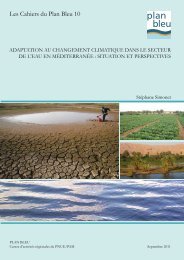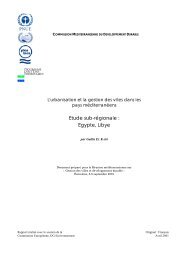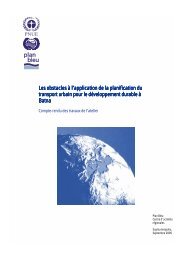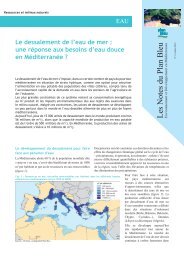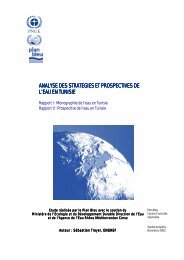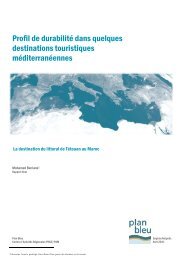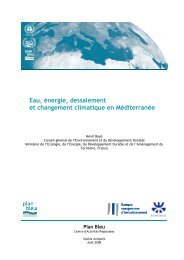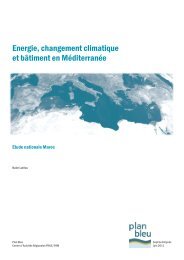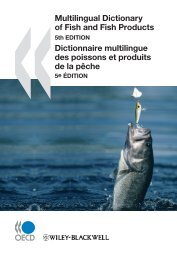Summary and Conclusions - Plan Bleu
Summary and Conclusions - Plan Bleu
Summary and Conclusions - Plan Bleu
You also want an ePaper? Increase the reach of your titles
YUMPU automatically turns print PDFs into web optimized ePapers that Google loves.
PLAN D’ACTION POUR LA M ÉDITERRANÉE<br />
M E D IT E R R A N E A N A C T IO N P LA N<br />
ATELIER SUR LES “OBSERVATOIRES” POUR L’ENVIRONNEMENT ET LE DEVELOPPEMENT<br />
DANS LES PAYS MEDITERRANEENS<br />
WORKSHOP ON ENVIRONMENT AND DEVELOPMENT “OBSERVATORIES”<br />
IN THE MEDITERRANEAN COUNTRIES<br />
Tunis, 18-20 novembre/November 1999<br />
<strong>Summary</strong> <strong>and</strong> <strong>Conclusions</strong>
I . CONTEXT AND GOALS OF THE TUNIS WORKSHOP<br />
1. The Goals of the Tunis Workshop<br />
The MAP/BLUE PLAN organised a workshop on "Environment <strong>and</strong> Development<br />
Observatories in the Mediterranean Countries" from the 18 th to the 20 th November 1999<br />
in Tunis, in co-operation with the Tunisian authorities <strong>and</strong> with the support of the<br />
European Commission (Life programme). The workshop was held under the presidency<br />
<strong>and</strong> patronage of Mrs. Faiza KEFI, Tunisian Minister for the Environment <strong>and</strong> L<strong>and</strong> use<br />
<strong>Plan</strong>ning <strong>and</strong> President of the Mediterranean Commission for Sustainable Development<br />
(MCSD).<br />
The workshop brought together representatives from 14 countries (Albania, Cyprus,<br />
Egypt, Spain, France, Greece, Italy, Lebanon, Malta, Morocco, Slovenia, Syria, Tunisia<br />
<strong>and</strong> Turkey) <strong>and</strong> several international organisations (MAP Co-ordinating Unit <strong>and</strong> Blue<br />
<strong>Plan</strong> <strong>and</strong> Specially Protected Areas RACs, European Environment Agency, CEDARE).<br />
This workshop was held 5 years after the 1 st workshop in Rabat on Observatories in the<br />
Mediterranean, <strong>and</strong> after varied Mediterranean work on indicators (Damascus, Beirut,<br />
Tunis, Rabat, Cairo, Split <strong>and</strong> Sophia Antipolis workshops), carried out between 1994<br />
<strong>and</strong> 1999 within the MCSD <strong>and</strong> METAP contexts, <strong>and</strong> co-ordinated by Blue <strong>Plan</strong>.<br />
The workshop had two main goals:<br />
• Getting acquainted with the state of advancement of various national<br />
•<br />
"Observatories" in the Mediterranean, sharing know-how in spheres of common<br />
interest from the various current experiences, <strong>and</strong> clarifying the observatories’ role<br />
<strong>and</strong> methods;<br />
Moving forward in the Mediterranean co-operation between generalist environment<br />
<strong>and</strong> development "observatories" <strong>and</strong> agreeing on a working proposal to be carried<br />
out jointly for implementing the recommendations on indicators from the Contracting<br />
Parties to the Barcelona Convention (Malta – 30th October 1999).<br />
2. A Changing Context<br />
Setting up an “Environment <strong>and</strong> Development Observatory” function meets a changing<br />
social <strong>and</strong> public dem<strong>and</strong>.<br />
When the MAP was set up in 1975, the Contracting Parties to the Barcelona Convention<br />
(the Mediterranean riparian countries <strong>and</strong> the European Community) wished this plan<br />
to include a specific component for monitoring <strong>and</strong> assessing environment/development<br />
major issues, which are common to the Mediterranean (creation of the Blue <strong>Plan</strong>). With<br />
the support of the European Commission (Life programme), this regional environment<br />
<strong>and</strong> development observatory function has been strengthened since 1993, thus allowing<br />
to carry out significant work, mainly on indicators for sustainable development, with all<br />
the Mediterranean countries.<br />
This initiative comes within the larger framework of expansion of public environmental<br />
policies in the various countries, especially since the 1992 Rio Summit. It echoes the<br />
recommendations of Agenda 21 <strong>and</strong> its Mediterranean corollary, MED 21, which (Cf.<br />
chapter 40), invite countries to:
- Strengthen their capabilities for monitoring <strong>and</strong> assessing progress towards<br />
sustainable development;<br />
- Adopt suitable indicators for measuring socio-economic, environmental <strong>and</strong> spatial<br />
changes;<br />
- Gather <strong>and</strong> structure relevant data;<br />
- Produce useful information for decision-makers;<br />
- Disseminate this information to the largest number of stakeholders.<br />
For the various Mediterranean countries members of the European Union, the set-up of<br />
the European Environment Agency in 1993, has represented a turning point. It led those<br />
countries to strengthen their capabilities in that field <strong>and</strong>, for some of them, to set up<br />
important national observatories (as was the case in France <strong>and</strong> in Italy for example)<br />
whose usefulness is widely acknowledged nowadays.<br />
In the Southern <strong>and</strong> Eastern Mediterranean countries, the set-up of generalist<br />
observatories started in 1994 with Morocco. The decision was taken whilst it was<br />
estimated that the annual cost of environmental damage in that country had reached<br />
8 % of GDP <strong>and</strong> it was therefore appropriate to devise strategic information, able to<br />
assist decision-makers in moving development towards taking the environment into<br />
account. Tunisia then created its national observatory while other Southern <strong>and</strong> Eastern<br />
countries are making efforts for setting-up similar functions.<br />
In the environment/development context characteristic of the Mediterranean, such<br />
observation/assessment functions can make up a powerful tool for applying the principle<br />
of integrating environment <strong>and</strong> development. Both for the present <strong>and</strong> future<br />
generations, the costs of not-taking the environment into account are in fact very high,<br />
<strong>and</strong> several sectoral policies need to be corrected, which calls for objective information on<br />
the difficulties to overcome.<br />
However, setting up national observatories is all too often faced with institutional<br />
difficulties <strong>and</strong> with a political will which is insufficiently expressed <strong>and</strong> offensive. In<br />
that context, Mediterranean co-operation appears as a major priority, especially in<br />
contributing to an improved definition of the observatories’ role <strong>and</strong> of the type of<br />
synergies to be developed between the regional <strong>and</strong> national levels. The interest of each<br />
country <strong>and</strong> of the whole Mediterranean region is at stake.<br />
II. "OBSERVATORIES" ROLE AND METHODS<br />
The work carried out at the workshop allowed meaningful progress to be made in<br />
clarifying <strong>and</strong> defining the desirable observatories’ functions. Eleven experiences carried<br />
out at national or regional (Mediterranean, <strong>and</strong> European) levels were presented <strong>and</strong><br />
discussed. Lessons drawn from those experiences led to the main conclusions set out<br />
below, which make up a kind of " guide " to what should be achieved in the<br />
Mediterranean, the pitfalls to avoid <strong>and</strong> the methodological directions to be taken into<br />
account.<br />
1. National Situations concerning Observing, Assessing <strong>and</strong> Reporting<br />
on the Environment<br />
A round-table discussion brought out the great diversity of national situations, with<br />
regard to contexts <strong>and</strong> level of institutional advancement in the countries, knowledge of<br />
the environment <strong>and</strong> conceptual approaches used.<br />
3
A functional diagram was presented by the Blue <strong>Plan</strong> (attached). The different<br />
Mediterranean countries can make use of it for positioning their "observatory" structure<br />
or devise in relation to the activities of:<br />
- Reporting on the environment,<br />
- Producing <strong>and</strong> using indicators,<br />
- Working with partners to gather data <strong>and</strong> information required for analysing<br />
environment/development issues,<br />
- Structuring the gathered data in information systems, adapted for producing new<br />
information.<br />
2. National Reports on the Environment<br />
The Reporting activity is one of the key assignments of an "observatory". It is a driving<br />
<strong>and</strong> federating activity, which gives meaning to all other tasks <strong>and</strong> activities carried out<br />
by an "observatory". At the same time, it is a challenge to be taken up.<br />
• In fact, in order to make a balance <strong>and</strong> a diagnosis of the environmental situation,<br />
reports on the environment should make good use of the whole available <strong>and</strong> useful<br />
information.<br />
• The activity thus requires considerable prior <strong>and</strong> post-networking:<br />
- In order to gather the data required (statistical, scientific, geographic, <strong>and</strong><br />
institutional data) for producing new information at various territorial levels <strong>and</strong><br />
in accordance with the issues selected,<br />
- In order to collate the thematic expertise essential to analysing issues <strong>and</strong><br />
interpreting data, <strong>and</strong> if appropriate, to compensate for gaps in the quantitative<br />
information.<br />
• This networking activity requires from the observatory to develop a significant<br />
steering capability <strong>and</strong> to have a clear vision of the expected result from the report<br />
conception stage. Once this has been acquired, the observatory can call upon data<br />
producers <strong>and</strong> outside experts (scientists, experts working in administrations,<br />
consultants) for the preparation of the report.<br />
An initial report of this type may not cover all the topics desired, nor aim at perfection<br />
from the outset; it shall nevertheless be drawn up on the basis of a phased<br />
implementation work-plan <strong>and</strong> on a defined methodology concerning:<br />
• The content: environment <strong>and</strong> development issues to be covered, observation scales,<br />
structure of the report (PSR framework) ;<br />
• The public targeted by the output, especially decision-makers, whilst also addressing<br />
vectors of public opinion (NGOs, the media).<br />
It is helpful to involve the carriers of public opinion in the drafting <strong>and</strong> dissemination of<br />
reporting outputs.<br />
3. Indicators for Sustainable Development<br />
Devising <strong>and</strong> using indicators lies at the heart of "Observatory" operations; this activity<br />
consists of selecting <strong>and</strong> enhancing data in order to create useful information for<br />
assisting decision-making <strong>and</strong> for inciting initiatives to be taken.<br />
This activity has a central role in structuring, organising <strong>and</strong> "merch<strong>and</strong>ising" the<br />
observatory operations involving:<br />
4
- Data: It forces choices to be made <strong>and</strong> allows priority data in terms of sustainable<br />
development to be identified. It can incite data producers to adapt their approaches<br />
<strong>and</strong> their collection <strong>and</strong> measurement systems;<br />
- Analysis: Indicators allow past trends to be measured, possible changes to be<br />
imagined <strong>and</strong> non-sustainable phenomena to be better appraised;<br />
- Assessment: Indicators help to set result-based goals <strong>and</strong>/or measure progress<br />
towards targets already set <strong>and</strong> distance to goals (performance indicators);<br />
- Reporting: Indicators make reports on the environment more objective <strong>and</strong><br />
enriched <strong>and</strong> thus constitute a favoured vehicle for communication. Their use<br />
guarantees comparability of reports over time.<br />
The activity on indicators is also a process for mobilising the several observatory<br />
partners <strong>and</strong> consolidating their mutual relationships for the benefit of both sides. By<br />
enhancing the already produced data <strong>and</strong> by transforming them into new information,<br />
indicators can bring a technical contribution to sustainable development issues in the<br />
frame of sectoral partnerships (e.g. agriculture/environment).<br />
In conclusion:<br />
• Indicators make up one of the main observatory’s activities <strong>and</strong> should be developed<br />
in every country;<br />
• The activity on indicators is to be developed in a harmonised context, in accordance<br />
with the decisions of the Contracting Parties (adoption of the common core set of<br />
Mediterranean indicators in application of the MCSD recommendations).<br />
4. Working with Partners for Gathering Environment <strong>and</strong> Development<br />
Data<br />
Environment <strong>and</strong> Development Observatories should not replace data producers. On the<br />
contrary, they shall establish dynamic relationships with the main data producers. For<br />
doing so, it is important:<br />
• To associate the main partners with the observatory activities FROM THE OUTSET;<br />
later, this association can be strengthened <strong>and</strong> widened to other partners by setting<br />
up Steering committees;<br />
• To convince them of the usefulness of the added value which will be brought to that<br />
data;<br />
• To make them aware of their responsibilities without trying to dispossess them or to<br />
replace them in part of their work (which can raise the issue of data quality control);<br />
• Sometimes, to provide them with financial (or material) incentives to produce data;<br />
• Not to under-estimate the time required for data gathering or the skills needed for<br />
dialoguing with producers. It may be useful to delegate these tasks to thematic<br />
specialists.<br />
It should be stressed that the institutional strengthening of exchanges with data<br />
producers (agreements, legal framework) is essential, even if this can be by-passed at the<br />
outset by relying on informal networking.<br />
5. Information Systems <strong>and</strong> Databases<br />
Practical lessons drawn from various experiences show that no st<strong>and</strong>ard information<br />
systems can exist without taking into account contexts <strong>and</strong> changes in priorities over<br />
5
time. The expression "information system" is made up of two terms, which implies the<br />
prior definition of the type of information involved (environmental fields, economic<br />
sectors…) before the system is devised.<br />
Building useful information systems is a real challenge for an "observatory". Lessons<br />
drawn from experience also show that:<br />
• Structuring data is not a technological issue,<br />
• Emphasis must be placed on work organisation,<br />
• The key issue is "where to start",<br />
• Above all, it is necessary to have a clear vision of the objectives to be reached, of what<br />
will be done with the data once gathered <strong>and</strong> structured.<br />
III. THE USEFULNESS OF "OBSERVATORIES" FOR ASSESSING AND FORMULATING<br />
PUBLIC ENVIRONMENT / DEVELOPMENT POLICIES<br />
A common view of what an ideal observatory should be was drawn from a panel<br />
discussion.<br />
1. The Ideal Observatory<br />
Firstly, it would supply useful information to decision-makers, that is information able<br />
to:<br />
• Show current changes <strong>and</strong> provide early warning signals in the case of malfunctions<br />
to be rectified or prevented (non-sustainable phenomena);<br />
• Assist to strategic decisions: help to appraise possible options for problem solving,<br />
with estimates on costs <strong>and</strong> impacts; assistance to moving sectoral policies towards<br />
greater sustainability; help to changing developmental <strong>and</strong> environmental policies<br />
especially to ensure sustainable management of natural resources <strong>and</strong> ecosystems<br />
<strong>and</strong> to allow decision-making in good time;<br />
• Contribute to setting quantified targets <strong>and</strong> to measuring progress <strong>and</strong> results of the<br />
"responses" implemented.<br />
It would also supply information able to generate a positive effect on the civil society’s<br />
behaviour, <strong>and</strong> lastly contribute to awakening the needed contradictory debate on the<br />
development / environment relationship <strong>and</strong> on the policies to be applied.<br />
In order to fulfil these functions, the ideal observatory:<br />
• Shall provide an added value. Its role is not to create data but to generate indicators,<br />
analyses, <strong>and</strong> reports which link the socio-economic <strong>and</strong> ecological systems with a<br />
systemic <strong>and</strong> prospective approach, <strong>and</strong> which assist to public decision-making;<br />
• Shall produce credible information founded on validated scientific data;<br />
• Shall be able to operate over time, which requires a solid institutional anchoring so<br />
as to guarantee the objectivity of the work carried out. This implies that the<br />
observatory shall not be shut-off in the narrow field of environment; it shall be vested<br />
with some independence <strong>and</strong> with precise <strong>and</strong> acknowledged role <strong>and</strong> status, with its<br />
own management <strong>and</strong> consultative bodies (management board or steering committee,<br />
scientific committee, user committee...)<br />
6
• Shall work in partnership <strong>and</strong> comply with the subsidiarity principle. The<br />
observatory shall play a catalysing role, co-ordinate the assessment of the<br />
environment /development relationships, <strong>and</strong> distribute information to the user<br />
community. However, it should not take on any direct operational function. It shall<br />
benefit from a contractual partnership with the required operators (statistics<br />
institutes, sectoral institutions holding useful data) which should acknowledge the<br />
observatory’s role <strong>and</strong> make the necessary data available to it.<br />
2. What should be done today to move towards this direction in the<br />
Mediterranean area?<br />
The set-up of observatories depends on a social <strong>and</strong> political dem<strong>and</strong>. Some regions <strong>and</strong><br />
countries (especially in the European Union) have already set up observatory structures,<br />
which are close to the ideal observatory. Their usefulness is acknowledged; their budgets<br />
are significant <strong>and</strong> growing. On the other h<strong>and</strong>, in some southern <strong>and</strong> eastern countries,<br />
the "observatory" functions are still at the project stage.<br />
Then, what should the priorities for action be?<br />
• First of all, being convinced of what is wanted in order to be convincing. Especially,<br />
answering the questions: what for, for whom, by whom <strong>and</strong> how.<br />
• “To produce in order to exist” <strong>and</strong> to take the plunge, making choices if necessary.<br />
For example by producing documents on indicators, even very simple brochures on<br />
well-identified non-sustainability issues (linking socio-economics <strong>and</strong> environment),<br />
<strong>and</strong> reports on the environment which may be not comprehensive or perfect. And do<br />
some marketing.<br />
• Find allies interested in the observatory’s production <strong>and</strong> added value: sectoral allies<br />
(tourism <strong>and</strong> agriculture), statistics institutes, the media <strong>and</strong> environmental<br />
associations, international organisations (especially MAP/Blue <strong>Plan</strong>, donors that will<br />
have to apply eco-conditions, etc.).<br />
• Institutionalise: think about <strong>and</strong> make proposals to the authorities on the legal<br />
status <strong>and</strong> the supervisory/steering system required.<br />
• Rely on the guidance, advice <strong>and</strong> references available especially at the<br />
Mediterranean or European level, <strong>and</strong> take part in the co-operation programmes put<br />
forward <strong>and</strong> in the implementation of the Contracting Parties decisions.<br />
IV. TOWARDS IMPLEMENTING THE RECOMMENDATIONS BY THE CONTRACTING<br />
PARTIES ON INDICATORS FOR SUSTAINABLE DEVELOPMENT<br />
Further to the MCSD work on indicators, the Contracting Parties to the Barcelona<br />
Convention have adopted recommendations <strong>and</strong> proposals for action concerning<br />
"indicators for sustainable development in the Mediterranean".<br />
These recommendations (attached) invite the different countries to gather, on a<br />
voluntary basis, the data required for calculating the 130 indicators selected for<br />
Mediterranean application <strong>and</strong> to effectively contribute to MAP's drawing up of the first<br />
Mediterranean report on sustainable development in 2002.<br />
This report will be mainly based on the selected indicators. It will highlight the unity<br />
<strong>and</strong> the diversity of situations in the region, current efforts towards sustainable<br />
development, difficulties encountered, etc. It will point out the medium or long term<br />
7
target results that have been clearly indicated by the States, besides some examples of<br />
good practise.<br />
National environment <strong>and</strong> development observatories <strong>and</strong> the equivalent agencies are<br />
therefore invited to contribute to this work with MAP. To this end, the workshop<br />
participants, based on the Blue <strong>Plan</strong> proposal, retained the following lines for action:<br />
• Preparation by the Blue <strong>Plan</strong> during the 1st quarter of 2000 of a glossary of indicators<br />
<strong>and</strong> of a 3-year project leading in 2002 to the Mediterranean report. Continuing<br />
calculating indicators at the regional level.<br />
• Calculation by the countries, during 2000, of the selected indicators calculable at the<br />
national scale with, if possible, their breakdown at the coastal regions (Nuts 3) <strong>and</strong><br />
coastal strip levels. Identifying meaningful local examples.<br />
• Organising a regional workshop for mid 2001 on the work carried out <strong>and</strong> for<br />
structuring the environment/ development analysis for the coastal regions (one of the<br />
main headings of the future report), on the basis of indicators calculated at that scale<br />
<strong>and</strong> of the expertise carried out.<br />
In order to successfully achieve this project, MAP- Blue <strong>Plan</strong> will disseminate the results<br />
of the Tunis workshop to all Mediterranean countries <strong>and</strong> ask for financial support from<br />
the European Commission with backing from various countries. MAP will associate EEA<br />
to this work.<br />
8
ATTACHED DOCUMENTS<br />
• List of participants<br />
• Blue <strong>Plan</strong>’s functional diagram for "Observatory" functions<br />
• List of distributed documents<br />
• Recommendations by the Contracting Parties to the Barcelona Convention on<br />
indicators for sustainable development (Malta, 30/10/99)<br />
9
ATELIER SUR LES “OBSERVATOIRES” DE L’ENVIRONNEMENT<br />
ET DU DEVELOPPEMENT DANS LES PAYS MEDITERRANEENS<br />
WORKSHOP ON ENVIRONMENT AND DEVELOPMENT “OBSERVATORIES”<br />
IN THE MEDITERRANEAN COUNTRIES<br />
Tunis, 18-20 novembre/November 1999<br />
Liste des participants / List of participants<br />
❍ PAYS MEDITERRANEENS / MEDITERRANEAN COUNTRIES<br />
(Sont signalés par un astérisque les pays invités à désigner 2 représentants / The countries invited to appoint 2 representatives are<br />
marked with an asterisk)<br />
ALBANIE Ms Tania FLOQI<br />
ALBANIA Director<br />
Research Institute of Industry (RILI)<br />
NATIONAL ENVIRONMENTAL AGENCY<br />
Blud “Zhan d’Ark” N°1<br />
Tirana<br />
Tel. : +355 (42) 23 291 / 26 509<br />
Fax : +355 (42) 65229 / 64 904<br />
E-mail : cep@cep.tirana.al<br />
CHYPRE Mrs Christina PANTAZI<br />
CYPRUS Environment Officer<br />
Environment Service<br />
MINISTRY OF AGRICULTURE NATURAL RESOURCES AND ENVIRONMENT<br />
1411 Nicosia<br />
Tel. : + 357 (2) 30 38 70<br />
Fax : + 357 (2) 77 49 45<br />
E-mail : rocperiv@cytanet.com.cy<br />
EGYPTE Mr Moussa IBRAHIM<br />
EGYPT Information System Dept. Manager<br />
EGYPTIAN ENVIRONMENTAL AFFAIRS AGENCY (EEAA)<br />
30, Misr Helwan El-Zyrae Road<br />
Maadi - Cairo<br />
Tel. : +20 (2) 52 56 476<br />
Fax : +20 (2) 52 56 479<br />
E-mail : moussai@intouch.com<br />
ESPAGNE M. Francisco CADARSO<br />
SPAIN Chef de Division<br />
MINISTERIO DE MEDIO AMBIENTE<br />
Plaza San Juan de la Cruz<br />
28071 Madrid<br />
Tel. : +34 (91) 597 64 90 (direct)<br />
Fax : +34 (91) 597 59 55<br />
E-mail : francisco.cadarso@sgca.mma.es
ATELIER SUR LES « OBSERVATOIRES » DE L’ENVIRONNEMENT ET DU DEVELOPPEMENT DANS LES PAYS MEDITERRANEENS – TUNIS, 18-20 NOVEMBRE 1999<br />
WORKSHOP ON THE ENVIRONMENT AND DEVELOPMENT « OBSERVATORIES » IN THE MEDITERRANEAN COUNTRIES - TUNIS, 18-20 NOVEMBER 1999<br />
FRANCE M. Thierry LAVOUX<br />
Chef du Département Etudes et Synthèses<br />
INSTITUT FRANÇAIS DE L’ENVIRONNEMENT (IFEN)<br />
61, Bd. Alex<strong>and</strong>re Martin<br />
45058 Orléans Cedex 1<br />
Tel. : 02 38 79 78 85<br />
Fax : 02 3879 78 70<br />
E-mail : thierry.lavoux@ifen.fr<br />
GRECE Ms Stamatia ARANVANTINOU<br />
GREECE Head of Office<br />
National Environmental Information Networks<br />
MINISTRY OF ENVIRONMENT, PHYSICAL PLANNING AND PUBLIC WORKS<br />
147, Patission Street<br />
11251 Athens<br />
Tel. : +30 (1) 86 43 737 ext 301<br />
Fax : +30 (1) 86 43 737<br />
E-mail : mata@nfp-gr.eionet.eu.int<br />
ITALIE Mr. Mario CIRILLO<br />
ITALY Head Settore Censimento fonti di emissione<br />
AGENZIA NAZIONALE PER LA PROTEZIONE DELL'AMBIENTE (ANPA)<br />
Via V. Brancati, 48<br />
00144 Rome<br />
Tel. : +39 (06) 50 07 28 01<br />
Fax : +39 (06) 50 07 29 86<br />
E-mail : Mario.Cirillo@anpa.it<br />
LIBAN Mr. Georges AKL<br />
LEBANON * Project Director<br />
Lebanese Environment <strong>and</strong> Development Observatory (LEDO)<br />
Tel. : +961 (4) 52 22 22 ext.475<br />
Fax : +961 (4) 41 89 10<br />
E-mail : g.akl@moe.gov.lb<br />
Melle. Lamia CHAMAS<br />
Point Focal de l'Observatoire Libanais (LEDO)<br />
Tel. : +961 (4) 52 22 22 ext.455/456<br />
Fax : +961 (4) 45 24 55<br />
E-mail : lchamas@moe.gov.lb<br />
MINISTERE DE L'ENVIRONNEMENT<br />
P.O. Box 70-1091<br />
Antelias<br />
MALTE Mr. Silvan CUTAJAR<br />
MALTA Pollution Control Co-ordinating Unit<br />
MINISTRY FOR THE ENVIRONMENT<br />
Starkey Annex<br />
Vittoriosa<br />
Tel.: +356 67 80 32<br />
Fax : +356 66 01 08<br />
E-mail : pollution@environment.gov.mt<br />
10
ATELIER SUR LES « OBSERVATOIRES » DE L’ENVIRONNEMENT ET DU DEVELOPPEMENT DANS LES PAYS MEDITERRANEENS – TUNIS, 18-20 NOVEMBRE 1999<br />
WORKSHOP ON THE ENVIRONMENT AND DEVELOPMENT « OBSERVATORIES » IN THE MEDITERRANEAN COUNTRIES - TUNIS, 18-20 NOVEMBER 1999<br />
MAROC M. Mokhtar BEGDOURI<br />
MOROCCO * Cadre à l'Observatoire National de l'environnement (Cellule SIDE)<br />
Tél. : +212 (7) 68 15 02 / 00 poste / extension 225<br />
Fax : +212 (7) 77 37 92<br />
M. Mourad AMIL<br />
Responsable du Service de suivi des projets de Développement<br />
Tél. : +212 (7) 68 07 44 / 15 00 poste / extension 233<br />
Fax : +212 (7) 77 37 92<br />
SECRETARIAT D'ETAT CHARGE DE L'ENVIRONNEMENT<br />
75 rue Sebou, Agdal<br />
Rabat<br />
SLOVENIE Ms Anita Pirc VELKAVRH<br />
SLOVENIA Counsellor to the Minister<br />
Ministry of Environment <strong>and</strong> Spatial <strong>Plan</strong>ning<br />
NATIONAL OFFICE FOR PHYSICAL PLANNING<br />
Vojkova 1/b<br />
SI-1001 Ljubljana<br />
Tel. : +386 (61) 178 45 34<br />
Fax : +386 (61) 178 40 52<br />
E-mail : anita.velkavrh@gov.si<br />
REPUBLIQUE ARABE SYRIENNE Mrs Abir ZENO<br />
SYRIAN ARAB REPUBLIC * Deputy Chief Engineering Group<br />
MINISTRY OF STATE FOR ENVIRONMENTAL AFFAIRS<br />
SEDO (Syrian Environment <strong>and</strong> Development Observatory) Project<br />
PO Box 3773 – Tolyani Street<br />
Damascus<br />
Tel. : +963 (11) 44 47 608 / 222 09 47<br />
Fax : +963 (11) 44 12 577 / 223 56 89<br />
E-mail :<br />
Mr. Zuhair JOUEJATI<br />
Counselor<br />
STATE PLANNING COMMISSION<br />
Althawra Street<br />
Damascus<br />
Tel. : +963 (11) 51 11 481<br />
Fax : +963 (11) 51 21 415<br />
E-mail :<br />
TUNISIE M. Béchir BEN MANSOUR<br />
TUNISIA * Président Directeur Général<br />
ANPE<br />
M. Samir MEDDEB<br />
Directeur de l'OTED<br />
Observatoire tunisien de l’environnement et du développement<br />
Tel. : +216 (1) 84 54 79<br />
M. Mohamed GHOURABI<br />
Directeur<br />
M. Mohamed SAÏD<br />
Directeur<br />
M. Yassine MARZOUGUI<br />
M. Tarek ROUROU<br />
M. Walid REKIK<br />
Melle Ines HOUARBI<br />
11
ATELIER SUR LES « OBSERVATOIRES » DE L’ENVIRONNEMENT ET DU DEVELOPPEMENT DANS LES PAYS MEDITERRANEENS – TUNIS, 18-20 NOVEMBRE 1999<br />
WORKSHOP ON THE ENVIRONMENT AND DEVELOPMENT « OBSERVATORIES » IN THE MEDITERRANEAN COUNTRIES - TUNIS, 18-20 NOVEMBER 1999<br />
Tunisie (suite)<br />
AGENCE NATIONALE DE PROTECTION POUR L'ENVIRONNEMENT (ANPE)<br />
12, rue du Cameroun - BP 52 Belvédère<br />
1002 Tunis<br />
Tel. : +216 (1) 84 71 22<br />
Fax : +216 (1) 84 80 69<br />
Melle Dhekra GHARBI<br />
M. Maher MAHJOUB<br />
M. Abd Errazzak El MARZOUGUI<br />
Ministère de l’Environnement et de l’Aménagement du Territoire<br />
Centre Urbain Nord – Imm. ICF<br />
Cité Essalama<br />
1030 Tunis Cedex<br />
Tél. : +216 (1) 70 40 00<br />
Fax : +216 (1) 70 24 31<br />
Mme Amel BIDA<br />
Chef de Service<br />
Agence Nationale des Energies Renouvelables<br />
3 rue 8000 - Montplaisir<br />
Belvédère - 1002 Tunis<br />
Tél. : +216 (1) 78 77 00<br />
Fax : +216 (1) 78 66 24<br />
M. Mohamed CHIHA<br />
Chef de Service<br />
Institut National de Statistique<br />
70 rue Echem<br />
Belvédère 1002 Tunis<br />
Tél. : +216 (1) 89 10 02<br />
Fax : +216 (1) 79 25 59<br />
M. Kaïs HAMZAOUI<br />
Chef de Service, DGCPL<br />
M. Rached KAMOUN<br />
Ingénieur en Chef<br />
Ministère de l’Intérieur<br />
Ave. Habib Bourguiba<br />
1000 Tunis<br />
Tél. : +216 (1) 33 30 00<br />
M. Mounir MAHJOUB<br />
Consultant<br />
3, Ave. Louis Braille<br />
Tél./Fax : +216 (1) 84 98 14<br />
E-mail : m.mahjoub@gnet.tn<br />
12
ATELIER SUR LES « OBSERVATOIRES » DE L’ENVIRONNEMENT ET DU DEVELOPPEMENT DANS LES PAYS MEDITERRANEENS – TUNIS, 18-20 NOVEMBRE 1999<br />
WORKSHOP ON THE ENVIRONMENT AND DEVELOPMENT « OBSERVATORIES » IN THE MEDITERRANEAN COUNTRIES - TUNIS, 18-20 NOVEMBER 1999<br />
TURQUIE Mr. Metin GÜRCÜ<br />
TURKEY * Environmental Expert<br />
E-mail :<br />
Mrs Müge ALTINALAN<br />
City <strong>Plan</strong>ner<br />
E-mail : mugealtinalan@yahoo.com<br />
General Directorate of EIA <strong>and</strong> <strong>Plan</strong>ning<br />
TEDO (Turkish Environment <strong>and</strong> Development Observatory) Project<br />
MINISTRY OF ENVIRONMENT<br />
Eskisehir Yolu 8 km Bilkent Kavsagy<br />
Ankara<br />
Tel. : +90 (312) 28 79 963 / 4323<br />
Fax : +90 (312) 28 52 910<br />
❍ AUTRES EXPERTS ET ORGANISATIONS REGIONALES / OTHER EXPERTS AND<br />
REGIONAL ORGANISATIONS<br />
STATE PLANNING ORGANISATION (SPO) Ms. Sema ALPAN<br />
Environmental Expert<br />
Prime Ministry<br />
STATE PLANNING ORGANISATION<br />
Necatibey cad. 108<br />
Ankara 06100<br />
TURKEY<br />
Tel: +90 (312) 23 08 720 ext. 6414<br />
Fax: +90 (312) 23 19 3678<br />
E-mail : salpan@dpt.gov.tr<br />
COMMISSION EUROPEENNE<br />
EUROPEAN COMMISSION<br />
AGENCE EUROPEENNE POUR M. Ronan UHEL<br />
L’ENVIRONNEMENT Project Manager - AEE<br />
EUROPEAN ENVIRONMENT AGENCY (EEA) Kongens Nytorv 6<br />
1050 Copenghagen / DANEMARK<br />
Tel. : +45 (33) 36 71 00<br />
Fax : +45 (33) 36 71 99<br />
E-mail : Ronan.Uhel@EEA.eu.int<br />
CENTRE POUR L’ENVIRONNEMENT ET LE Mr. Hossam ALLAM<br />
DEVELOPPEMENT DE LA REGION ARABE Environmental Information Systems Specialist<br />
ET L’EUROPE CEDARE<br />
CENTRE FOR ENVIRONMENT AND 21/23 Giza Street<br />
DEVELOPMENT FOR THE ARAB REGION Nile Tower Build. 13th Floor - PO Box 52<br />
AND EUROPE (CEDARE) Orman Giza / EGYPT<br />
Tel. : +20 (2) 570 18 59 / 34 73 / 09 79<br />
Fax : + 20 (2) 570 32 42<br />
E-mail : hallam@cedare.org.eg<br />
13
ATELIER SUR LES « OBSERVATOIRES » DE L’ENVIRONNEMENT ET DU DEVELOPPEMENT DANS LES PAYS MEDITERRANEENS – TUNIS, 18-20 NOVEMBRE 1999<br />
WORKSHOP ON THE ENVIRONMENT AND DEVELOPMENT « OBSERVATORIES » IN THE MEDITERRANEAN COUNTRIES - TUNIS, 18-20 NOVEMBER 1999<br />
INSTITUT NATIONAL DE LA RECHERCHE M. Mohamed ENNABLI<br />
SCIENTIFIQUE ET TECHNIQUE Directeur<br />
INSTITUT NATIONAL DE LA RECHERCHE SCIENTIFIQUE ET TECHNIQUE<br />
Route touristique Soliman<br />
Borj-Cedria - B.P. 95<br />
2020 Hamman-lif –Tunis / TUNISIE<br />
Tel. : +216 (1) 430 215<br />
Fax : +216 (1) 430 934<br />
PROGRAMME DES NATIONS UNIES POUR M. Arab HOBALLAH<br />
L’ENVIRONNEMENT (PNUE) Coordonnateur adjoint<br />
UNITE DE COORDINATION DU PLAN Unité de Coordination du<br />
D’ACTION POUR LA MEDITERRANEE PLAN D'ACTION POUR LA MEDITERRANEE (PAM)<br />
UNITED NATIONS ENVIRONMENT Vass. Konstantinou 48<br />
PROGRAMME (UNEP) 116 35 Athens / GRECE<br />
CO-ORDINATING UNIT FOR THE Tel. : +30 (1) 727 31 26<br />
MEDITERRANEAN ACTION PLAN Fax : +30 (1) 725 31 96<br />
E-mail : hoballah@unepmap.gr<br />
CENTRE D’ACTIVITES REGIONALES POUR M. Adel HENTATI<br />
LES AIRES SPECIALEMENT PROTEGEES Directeur<br />
(CAR/ASP) CENTRE D’ATIVITES REGIONALES POUR LES AIRES SPECIALEMENT PROTEGEES<br />
REGIONAL ACTIVITY CENTRE FOR Boulevard de l’Environnement – BP337<br />
SPECIALLY PROTECTED AREAS 1080 Tunis Cedex<br />
(RAC/SPA) Tél. : +216 (1) 795 760<br />
Fax : +216 (1) 797 349<br />
E-mail : car-asp@rac-spa.org.tn<br />
PLAN BLEU – CENTRE D’ACTIVITES M. Guillaume BENOIT<br />
REGIONALES (CAR/PB) Directeur<br />
BLUE PLAN - REGIONAL ACTIVITY<br />
CENTRE (BP/RAC) Madame Aline COMEAU<br />
Directeur scientifique<br />
E-mail : acomeau@planbleu.org<br />
Madame Silvia LARÍA<br />
Chargée des Etudes Institutionnelles<br />
E-mail : slaria@planbleu.org<br />
PLAN BLEU<br />
Centre d’Activités Régionales<br />
15, rue L. Van Beethoven<br />
Sophia Antipolis<br />
06560 Valbonne<br />
FRANCE<br />
Tel. : +33 (4) 92 38 71 30<br />
Fax : +33 (4) 92 388 71 31<br />
E-mail : planbleu@planbleu.org<br />
14
RECOMMENDATIONS AGENDA 21<br />
• To strengthen capacities for the follow-up <strong>and</strong><br />
assessment of progress towards sustainable<br />
development<br />
• To disseminate broadly the information<br />
produced<br />
• To produce useful information for decisionmakers<br />
• To adopt indicators for measuring<br />
changes across socio-economic,<br />
environmental <strong>and</strong> spatial dimensions<br />
• To gather, assess <strong>and</strong> process relevant<br />
data<br />
Statistical<br />
Compendiums<br />
Geographi<br />
cal data<br />
OBSERVING, ASSESSING AND REPORTING<br />
ON ENVIRONMENT AND DEVELOPMENT<br />
USERS:<br />
decision-makers, general public, scientific community…<br />
REPORTS on environment <strong>and</strong> development,<br />
<strong>and</strong> derived products (synopsis, translated summaries, press<br />
releases…)<br />
Publications focussed on<br />
indicators<br />
(sheets, atlas …)<br />
Information systems <strong>and</strong> databases<br />
(data structuring <strong>and</strong> processing, statistical analyses,<br />
geo-referencing …)<br />
Socioeconomic<br />
statistical data<br />
Environmental<br />
statistical<br />
data<br />
Thematic DOSSIERS,<br />
regional monographies<br />
Thematic, sectoral, environmental performance,<br />
sustainable development…<br />
INDICATORS<br />
Selective<br />
data<br />
REGULAR DATA COLLECTION SPECIFIC DATA COLLECTION<br />
Non<br />
quantitative<br />
Information,<br />
coming from<br />
expertise,<br />
research…<br />
Partnerships & networks with data & information producers<br />
(environmental administrative services, other sectoral administrations, statistical instituts,<br />
research bodies, NGOs…)<br />
DISSEMINATION<br />
WRITING<br />
MAIN ACTIVITIES<br />
SYNTHESIS AND ENHANCING OF<br />
INFORMATION<br />
ANALYSIS AND ASSESSMENT OF TRENDS,<br />
OF POLICY EFFETS<br />
(i.e. Industry <strong>and</strong> environment, L<strong>and</strong> use<br />
<strong>and</strong> environment…)<br />
DATA ANALYSIS AND PROCESSING<br />
GATHERING DATA AND INFORMATION<br />
<strong>Plan</strong> <strong>Bleu</strong>, 1999
ATELIER SUR LES « OBSERVATOIRES » DE L’ENVIRONNEMENT ET DU DEVELOPPEMENT DANS LES PAYS MEDITERRANEENS – TUNIS, 18-20/11/99<br />
ATELIER SUR LES “OBSERVATOIRES” DE L’ENVIRONNEMENT<br />
ET DU DEVELOPPEMENT DANS LES PAYS MEDITERRANEENS<br />
WORKSHOP ON ENVIRONMENT AND DEVELOPMENT “OBSERVATORIES”<br />
SESSION 1. OUVERTURE<br />
IN THE MEDITERRANEAN COUNTRIES<br />
Tunis, 18-20 novembre/November 1999<br />
Liste des communications et des documents distribués<br />
Observation, évaluation et reporting sur l’environnement et le développement en<br />
Méditerranée<br />
PAM/PNUE. Arab HOBALLAH. Introduction. 9 p. (transparents)<br />
Document complémentaire : <strong>Conclusions</strong> du Colloque international sur “Les Observatoires pour le’Environnement et le<br />
Développement: un outil d’information et d’aide à la décision”, Rabat 7-10 décembre 1994. 6 p. (Français / Anglais).<br />
PLAN BLEU. Silvia LARÍA. Schéma fonctionnel de l’observation, évaluation et reporting sur l’environnement:<br />
Recomm<strong>and</strong>ations d’Agenda 21, Chapitre 40 “L’information pour la prise de décisions”, schéma fonctionnel, objectifs de l’atelier.<br />
3 p. (Français / Anglais).<br />
PLAN BLEU. Aline COMEAU. L’observation de l’environnement et du développement en Méditerranée. 2 p. (transparents).<br />
Situations nationales en matière d’observation, évaluation et reporting sur l’environnement<br />
Albanie. Tania FLOQI, National Environmental Agency. National Situation on Environmental Observing Assessing <strong>and</strong><br />
Reporting. 13 p. (Anglais).<br />
Chypre. Christina PANTAZI, Ministry of Agriculture, Natural Resources <strong>and</strong> Environment. National Situation on<br />
Environmental Observing Assessing <strong>and</strong> Reporting. 2 p. (Anglais)<br />
Document complémentaire : Report on Major Environment Issues. 28 p. (Anglais).<br />
Egypte. Moussa IBRAHIM MOUSSA, Egyptian Environmental Affairs Agency. Monitoring Project. 4 p. (Anglais).<br />
Document complémentaire : Egyptian Environmental Policy Framework. 20 p. (Anglais).<br />
Espagne. Francisco CADARSO, Ministerio de Medio Ambiente. Observation, évaluation et reporting sur<br />
l’environnement : le cas de l’Espagne. 1 p. (Anglais/Français).<br />
Grèce. Stamatia ARAVANTINOU, Ministry of Environment, Physical <strong>Plan</strong>ning <strong>and</strong> Public Works. Observing,<br />
networking, reporting, assessment in Greece. 16 p. (Anglais).<br />
Italie. Mario Cirillo, National Agency for Environmental Protection (ANPA). ANPA for the environment: ’98 <strong>and</strong> ’99 in<br />
brief. 12 p. (Anglais).<br />
Liban. Georges AKL, Ministère de l’environnement. Présentation du LEDO. 11 p. (Anglais).<br />
Malte. Silvan CUTAJAR, Ministère de l’environnement. National situation concerning observing, assessing <strong>and</strong> reporting<br />
on the environement. 27 p. (Anglais).<br />
16
ATELIER SUR LES « OBSERVATOIRES » DE L’ENVIRONNEMENT ET DU DEVELOPPEMENT DANS LES PAYS MEDITERRANEENS – TUNIS, 18-20/11/99<br />
Maroc. Mokhtar BEGDOURI, Ministère de l’Aménagement du territoire, de l’environnement, de l’urbanisme et de<br />
l’habitat. Observatoire National de l’Environnement du Maroc. 5 p.<br />
Document complémentaire : Rapport sur l’Etat de l’environnement au Maroc. Working draft. Octobre 1999. 8 p.<br />
(Table des matières)<br />
Slovénie. Anita Pirc VELKAVRH, Ministry of Environment d<strong>and</strong> Spatial <strong>Plan</strong>ning. Environmental information <strong>and</strong><br />
reporting in Slovenia. 5 p. (Anglais).<br />
- Document complémentaire : Environment in Slovenia, 1996. Pocketbook. 41 p.<br />
Syrie. Abir ZENO, Ministry of Environment. The Syrian Environment <strong>and</strong> Development Observatory. 7 p. (Anglais).<br />
Tunisie. Samir MEDDEB, Agence nationale de protection de l’environnement. Situation nationale en matière<br />
d’observation, évaluation et reporting sur l’environnement. 6 p.<br />
Turquie. Müge ALTINALAN, Ministry of Environment. Actions of MoE. 4 p.<br />
SESSION 2. LES RAPPORTS NATIONAUX SUR L’ENVIRONNEMENT, UNE PRODUCTION<br />
MAJEURE DES “OBSERVATOIRES”<br />
Présentations de cas<br />
Tunisie. Samir MEDDEB, ANPE. Les rapports nationaux sur l’environnement, une production majeure des<br />
“observatoires”. Tunisie. 10 p.<br />
République tunisenne. Ministère de l’Environnement et de l’Aménagement du Territoire. Agence Nationale de<br />
Protection de l’Environnement. Rapport National. L’état de l’environnement 1998. 104 p. (Arabe, Français).<br />
Republic of Tunisia. Ministry for the Environment <strong>and</strong> L<strong>and</strong> Use <strong>Plan</strong>ning. National report. The State of the<br />
Environment 1997. 111p.<br />
Italie. Mario CIRILLO, ANPA.<br />
Ministry of Environment. The environment in Italy: key facts <strong>and</strong> figures. 52 p. (Anglais).<br />
Turquie. Müge ALTINALAN, Ministry of Environment. Turkish environmental atlas - 96. 5 p.<br />
Autres documents distribués<br />
France. IFEN. The environment in France 1999. 316 p. (Anglais)<br />
SESSION 3. DES INDICATEURS POUR EVALUER LES TENDANCES DU DEVELOPPEMENT<br />
ECONOMIQUE ET LES IMPACTS SUR L’ENVIRONNEMENT<br />
Présentation de cas<br />
<strong>Plan</strong> <strong>Bleu</strong>. Aline COMEAU. La démarche indicateurs au <strong>Plan</strong> <strong>Bleu</strong>. 5 p. (transparents)<br />
<strong>Plan</strong> <strong>Bleu</strong>. Les indicateurs pour le développement durable en Méditerranée. Version provisoire = Indicators for sustainable<br />
development in the Mediterranean Region. Draft. 1999. (Anglais/Français)<br />
<strong>Plan</strong> <strong>Bleu</strong>. Annexe 4 : Les indicateurs pour le développement durable en Méditerranée. Version provisoire. = Annexe 4.<br />
Indicators for sustainable development in the Mediterranean Region. Draft. 1999. 5 p. (Anglais/Français)<br />
17
ATELIER SUR LES « OBSERVATOIRES » DE L’ENVIRONNEMENT ET DU DEVELOPPEMENT DANS LES PAYS MEDITERRANEENS – TUNIS, 18-20/11/99<br />
METAP III : Programme de renforcement des capacités environnementales. Indicateurs de performance<br />
environnementale. Rapport de Synthèse de trois ateliers sous-régionaux méditerranéens, 1998. 8 p. (Français – Anglais)<br />
<strong>Plan</strong> <strong>Bleu</strong>. Document cadre. Atelier sous-régional : Indicateurs de performance environnementale. Rabat, 24-26<br />
septembre 1994. (Français 16 p. – Anglais 15 p.).<br />
France. Thierry LAVOUX, IFEN. Indicateurs de performance en France. 13 p. (transparents)<br />
Cécile Rechatin, IFEN. Environmental performance indicators in France 1996-1997. 125 p. (Anglais/Français)<br />
Slovénie. Anita Pirc VELKAVRH, Ministry of Environment <strong>and</strong> Spatial <strong>Plan</strong>ning. Sustainable Mediterranean indicators<br />
tested in Slovenia. May 1999. 16 p. (Anglais).<br />
Autres documents distribués<br />
Turkey. Prime Ministry, State <strong>Plan</strong>ning Organisation. National Environmental Action <strong>Plan</strong>. 13 p. (Anglais)<br />
Turkey. Environmental indicators for monitoring the NEAP of Turkey. 14 p. (Anglais)<br />
SESSION 4. LE TRAVAIL EN PARTENARIAT POUR RASSEMBLER LES DONNEES SUR<br />
L’ENVIRONNEMENT ET LE DEVELOPPEMENT<br />
Présentation de cas<br />
Maroc. Mourad AMIL, Secrétariat d’Etat chargé de l’Environnement. Système d’Information et Données sur<br />
l’Environnement (SIDE) : un partenariat qui se construit. 4 p. (Français) + 19 transparents.<br />
SESSION 5. SYSTEMES D’INFORMATION ET BASES DE DONNEES: STRUCTURATION DES<br />
DONNEES STATISTIQUES ET GEOGRAPHIQUES<br />
Présentation de cas<br />
Espagne. Francisco CADARSO, Ministère de l’Environnement d’Espagne. Systèmes d’Information et bases de données:<br />
structuration des données statistiques et géographiques. Le cas de l’Espagne. 9 p. (Anglais/Français).<br />
CEDARE. Hossam ALLAM. Capacity Building in Environmental Information Systems : CEDARE’s experience. 15 p.<br />
(Anglais). (Transparents)<br />
AEE (Agence européenne de l’Environnement). Ronan UHEL. The EEA Information System: Organisation, experience <strong>and</strong><br />
difficulties. (Transparents). 33 p. (Anglais).<br />
18
ATELIER SUR LES « OBSERVATOIRES » DE L’ENVIRONNEMENT ET DU DEVELOPPEMENT DANS LES PAYS MEDITERRANEENS – TUNIS, 18-20/11/99<br />
SESSION 7. PARTENARIATS ET COOPÉRATION EN MÉDITERRANÉE<br />
PLAN BLEU, Silvia LARÍA. Relevé des points forts, séances 1 à 6 de l’Atelier. (4 p.)<br />
PAM/PNUE , Arab HOBALLAH. Recomm<strong>and</strong>ations des Etats méditerranéens concernant les Indicateurs pour un<br />
développement durable, approuvées à Malte, 30/10/99.<br />
Recomm<strong>and</strong>ations et Propositions d’actions approuvées par les Parties Contractantes (Malte, 27-30 octobre 1999) sur le<br />
thème : Indicateurs pour le développement durable en Méditerranée. UNEP (OCA)MED IG. 12/9 Annexe IV,<br />
Appendice IV, pp. 1-2 (Français) ; UNEP (OCA)MED IG. 12/9 Annexe VI, Appendix II (Anglais )<br />
PLAN BLEU, Aline COMEAU. Proposition du <strong>Plan</strong> <strong>Bleu</strong> d’un projet de coopération entre “observatoires” pour 2000-<br />
2002. L’observation des progrès vers le développement durable en Méditerranée : un processus collégial (calcul des indicateurs,<br />
appui au travail d’analyse et reporting). 1 p. (Français/ Anglais).<br />
19
ANNEX II<br />
Mediterranean Commission on Sustainable Development<br />
20<br />
UNEP(OCA)/MED IG.12/3<br />
Annex II<br />
page 20<br />
Recommendations <strong>and</strong> Proposals for action on the theme of:<br />
INDICATORS FOR SUSTAINABLE DEVELOPMENT IN THE MEDITERRANEAN<br />
Proposals<br />
The Contracting Parties to the Barcelona Convention, with the support of actors from civil<br />
society, are invited to set up on a voluntary basis a Mediterranean system of indicators for<br />
sustainable development for use by:<br />
• Mediterranean riparian States;<br />
• Actors in multilateral co-operation in the region ;<br />
• Actors from civil society (local authorities, companies, associations, …).<br />
1. Adoption of a common set of indicators: A first set of 130 basic indicators (of which 55<br />
are more easy to calculate in view of the relevance <strong>and</strong> availability of data for an<br />
adequate number of countries) would be submitted to the Contracting Parties. Each<br />
country would compile them, where possible <strong>and</strong> on a voluntary basis, for the purposes<br />
of work at the Mediterranean level. This list may be changed in accordance with tests<br />
carried out in the countries, <strong>and</strong> in accordance with guidance <strong>and</strong> requirements<br />
expressed by the Mediterranean Commission on Sustainable Development.<br />
2. Complementary indicators: The indicators selected in the common core set cannot<br />
alone make up an adequate framework for an in-depth examination of various subjects<br />
<strong>and</strong> for work on sustainable development policies on special fields or territories. MAP, the<br />
States <strong>and</strong> local authorities will endeavour to propose, test <strong>and</strong> record complementary<br />
pressure, state <strong>and</strong> response indicators.<br />
3. Harmonization <strong>and</strong> dissemination of indicators to facilitate work at the national<br />
level: MAP will create a «glossary» which sets out definitions <strong>and</strong> the methods for<br />
drawing up indicators. MAP will also keep an up-to-date dossier illustrating all selected<br />
indicators, including a table of trends by country <strong>and</strong> at regional level from 1960 onwards<br />
with graphical illustrations, in addition to comments on difficulties in collection <strong>and</strong><br />
possible interpretations. MAP will disseminate this work on the Internet.<br />
4. Mediterranean report: The Contracting Parties are invited to contribute effectively to the<br />
production <strong>and</strong> publication by MAP of a report on sustainable development in the<br />
Mediterranean. The first report shall be drawn up in the year 2002.<br />
This report will be based in particular on indicators for sustainable development.<br />
It will show the unity <strong>and</strong> diversity of situations in the region, current efforts towards<br />
sustainable development, difficulties encountered, good practices, etc.<br />
It will be submitted by the MAP to the Contracting Parties <strong>and</strong> the MCSD.<br />
5. National reports: States are invited to supply MAP with the national reports prepared for<br />
the United Nations Commission for Sustainable Development, <strong>and</strong> to facilitate<br />
comparative studies on Mediterranean issues undertaken by Blue <strong>Plan</strong> (series of<br />
Mediterranean Country Profiles).<br />
These national summaries will indicate result-based goals in the medium <strong>and</strong> long term,<br />
which are clearly stated <strong>and</strong> adopted by States, as well as examples of good practice.
21<br />
UNEP(OCA)/MED IG.12/3<br />
Annex II<br />
page 21<br />
6. Capacity Building: The Contracting Parties are invited: to mobilize national statistical<br />
institutions <strong>and</strong> instruct environment <strong>and</strong> development observatories, or equivalent<br />
agencies, to monitor <strong>and</strong> enhance indicators at the national level; <strong>and</strong> to develop them<br />
into preferential links at the Mediterranean level.<br />
They are invited to develop appropriate programmes, possibly with regional financial<br />
support, to build their capacities:<br />
• to promote the use of indicators for sustainable development;<br />
• to harmonize environmental <strong>and</strong> socio-economic statistics; <strong>and</strong><br />
• to ensure coordination with all the institutions concerned<br />
7. Follow up: MAP will follow up this work through the activities centres, <strong>and</strong> particularly the<br />
Blue <strong>Plan</strong>. It will supplement the work with new activities to examine specific themes in<br />
greater depth in collaboration with other competent national <strong>and</strong> international<br />
organizations. The MCSD will follow the work <strong>and</strong>, where necessary, will call on the task<br />
managers, who may propose the holding of the appropriate meetings.


